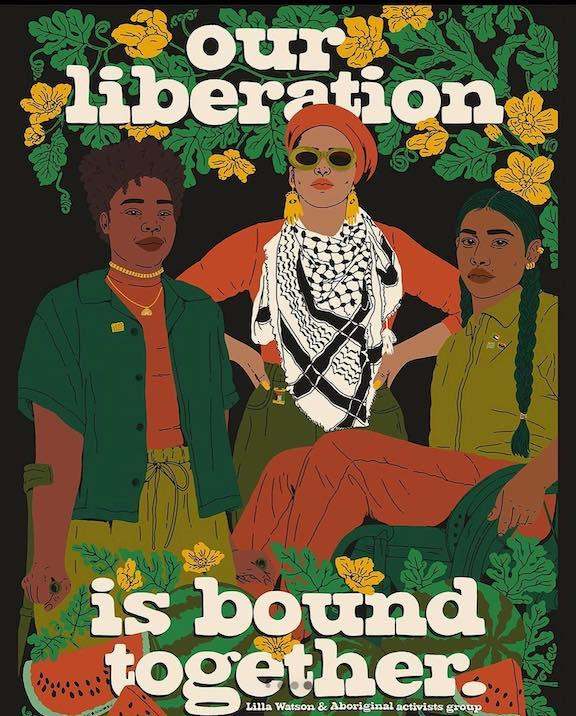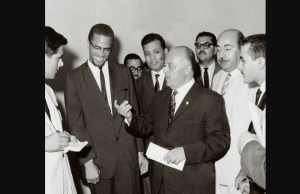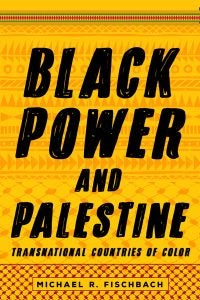
MAAS alum Dr. Michael R. Fischbach discusses his groundbreaking research on divisions within the 1960s Black Freedom Struggle in America over the Israel-Palestine conflict and how Black Power activists supported the Palestinian struggle for liberation—planting the seeds for transcontinental solidarity that continues today.
By Michael R. Fischbach
Back in 2010, I stumbled by chance across a reference to the fact that American Black Power advocate Malcolm X traveled from Cairo to Gaza for a two-day visit in September 1964. He had been in Cairo attending a conference of the Organization of African Unity and was driven to Gaza to meet with Palestinians and survey the situation facing the population there. He returned to Cairo, met with officials of the newly established Palestine Liberation Organization (PLO), and wrote a scathing attack on Zionism in an English-language Egyptian newspaper. I was stunned. After decades of deep familiarity with the history of Palestine/Israel (including publishing three books on the losses sustained by Palestinian refugees and Jews who left the region following the 1948 Arab-Israeli War), as well as American history during the 1960s, I had never heard of this trip or indeed of any Black American connections to the Arab-Israeli conflict during the era of Civil Rights and Black Power.

This surprising information about Malcolm X—along with revelations about other famous Americans of the 1960s traveling to the Middle East and meeting with Palestinians—prompted me to embark upon a years-long research project on the ways that American political activists reached beyond domestic concerns to focus on issues relating to Israel and the Palestinians during the Long 1960s (the period from the late 1950s to the early 1970s). My research led me to university and government archives in a number of U.S. states and foreign countries, as well as a deep dive into other primary and secondary sources. I also sought out classified U.S. government documents via the Freedom of Information Act and conducted many interviews in America and the Middle East. This lengthy project resulted in two books: Black Power and Palestine: Transnational Countries of Color and The Movement and the Middle East: How the Arab-Israeli Conflict Divided the American Left, published by Stanford University Press in 2018 and 2019, respectively.
 In Black Power and Palestine, I document how both “wings” of the Black Freedom Struggle in the 1960s and 1970s—the Civil Rights wing and the Black Power wing—not only engaged with the Palestinians, Israel, and the Arab-Israeli conflict but embraced one side or the other in ways that not only reflected their ideologies but also their own sense of identity and political activism in America. Black Power advocates felt that they were waging a revolutionary struggle within the United States and thus saw the Palestinians as a kindred people of color also waging a revolutionary struggle for freedom, alongside other Global South peoples during the age of decolonization. By contrast, Civil Rights leaders sought to reform the U.S., not revolutionize it. Supporting Israel, an American ally, along with moderate white allies who were helping them fight for Civil Rights “within the system,” was in keeping with this reformist vision.
In Black Power and Palestine, I document how both “wings” of the Black Freedom Struggle in the 1960s and 1970s—the Civil Rights wing and the Black Power wing—not only engaged with the Palestinians, Israel, and the Arab-Israeli conflict but embraced one side or the other in ways that not only reflected their ideologies but also their own sense of identity and political activism in America. Black Power advocates felt that they were waging a revolutionary struggle within the United States and thus saw the Palestinians as a kindred people of color also waging a revolutionary struggle for freedom, alongside other Global South peoples during the age of decolonization. By contrast, Civil Rights leaders sought to reform the U.S., not revolutionize it. Supporting Israel, an American ally, along with moderate white allies who were helping them fight for Civil Rights “within the system,” was in keeping with this reformist vision.
My research also charts how, despite the demise of Black Power by the mid-1970s, support for the Palestinians did not recede but began extending into the Black mainstream. Among other things, this became clear when traditional Civil Rights figures like Joseph Lowery, Jesse Jackson, and Andrew Young involved themselves in Arab-Israeli peacemaking by meeting with Yasir Arafat and others in the PLO in 1979. Other mainstream African American groups like the Congressional Black Caucus began speaking up for Palestinian human rights. Black support for the Palestinians had come to stay.
Many things struck me when carrying out this research. One was the sophisticated, deeply ideological, and strident nature of what many Black Power advocates said and wrote about Palestine/Israel. This was particularly true of the writings of various members of the Black Panther Party as well as activists like Malcolm X and Stokely Carmichael (Kwame Ture). Conversely, it amazed me to see how much certain traditional Civil Rights leaders like Roy Wilkins and, in particular, Bayard Rustin (the subject of the 2023 film Rustin, starring Academy Award nominee Colman Domingo), went to great lengths to embrace Israel, champion it, and consciously (and also stridently) distance themselves from Black Power attacks on the Jewish state.
When Black Power and Palestine came out in 2018, the historical events and ideas it explored proved to be highly relevant to what was happening in the world at the time: the emergence of the Black Lives Matter movement, the rise of intersectional American activism around various global issues, and the growing and concomitant prominence of public Black support for the Palestinians. Now, six years after publication, the book and the issues it documents continue to gain traction. Since the Hamas attack on Israel on October 7 and Israel’s resultant invasion of Gaza, I have received numerous interview requests from media in the U.S., Europe, and Asia asking me to comment, not on the situation in Gaza, but rather on why many Black Americans have been outspoken in their support for the Palestinians, both historically and today. Such requests not only highlight the ways in which African Americans continue to involve themselves in the Question of Palestine but also the fact that the mainstream media is paying attention to this phenomenon. This is particularly true as the Democratic Party tries to mobilize Black voters in advance of the November 2024 presidential elections amidst serious internal party divisions over President Biden’s indulgence of Israel’s war in Gaza. It is not just Black lives that matter, but Black voices and votes as well.
Dr. Michael R. Fischbach is Professor of History at Randolph-Macon College. He graduated from the MAAS program in 1986 and was CCAS’ first-ever doctoral fellow at Georgetown’s Department of History, where he received his PhD in 1992.
This article was published in the Fall 2023-Spring 2024 issue of the CCAS Newsmagazine.